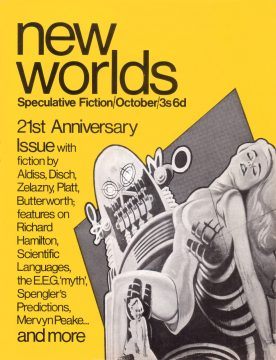Mark Dorrian at Cabinet:
 No doubt Ballard and Pevsner make strange bedfellows, but if we accept—and I think we can—that Pevsner’s charge of “outrageous stimulation” was a localized condemnation of broader tendencies, then there is a connection. For the diagnosis of “outrageous stimulation” was one that Ballard, in a strong sense, shared, although the consequences he drew were radically different. As he wrote in a later reflection: “A unique collision of private and public fantasy took place in the 1960s. … The public dream of Hollywood for the first time merged with the private imagination of the hyper-stimulated 60s TV viewer.” However for Ballard, the outcome of this was not some sort of constant escalation of experience—on the contrary “its finish line,” he wrote, “was that death of affect, the lack of feeling, which seemed inseparable from the communications landscape.” Whereas Pevsner’s demand on the cusp of the 1960s was to rein in the new license and reassert prior controls, Ballard’s suggestion was instead to embrace existing conditions and pursue their possibilities. “Given the unlimited opportunities which the media landscape now offers to the wayward imagination,” he wrote, “I feel we should immerse ourselves in the most destructive element, ourselves, and swim.” The best we can hope for of the twentieth century, he continued, is “the attainment of a moral and just psychopathology.”
No doubt Ballard and Pevsner make strange bedfellows, but if we accept—and I think we can—that Pevsner’s charge of “outrageous stimulation” was a localized condemnation of broader tendencies, then there is a connection. For the diagnosis of “outrageous stimulation” was one that Ballard, in a strong sense, shared, although the consequences he drew were radically different. As he wrote in a later reflection: “A unique collision of private and public fantasy took place in the 1960s. … The public dream of Hollywood for the first time merged with the private imagination of the hyper-stimulated 60s TV viewer.” However for Ballard, the outcome of this was not some sort of constant escalation of experience—on the contrary “its finish line,” he wrote, “was that death of affect, the lack of feeling, which seemed inseparable from the communications landscape.” Whereas Pevsner’s demand on the cusp of the 1960s was to rein in the new license and reassert prior controls, Ballard’s suggestion was instead to embrace existing conditions and pursue their possibilities. “Given the unlimited opportunities which the media landscape now offers to the wayward imagination,” he wrote, “I feel we should immerse ourselves in the most destructive element, ourselves, and swim.” The best we can hope for of the twentieth century, he continued, is “the attainment of a moral and just psychopathology.”
more here.
